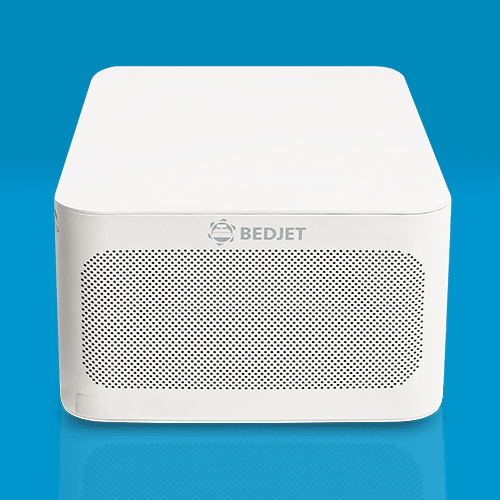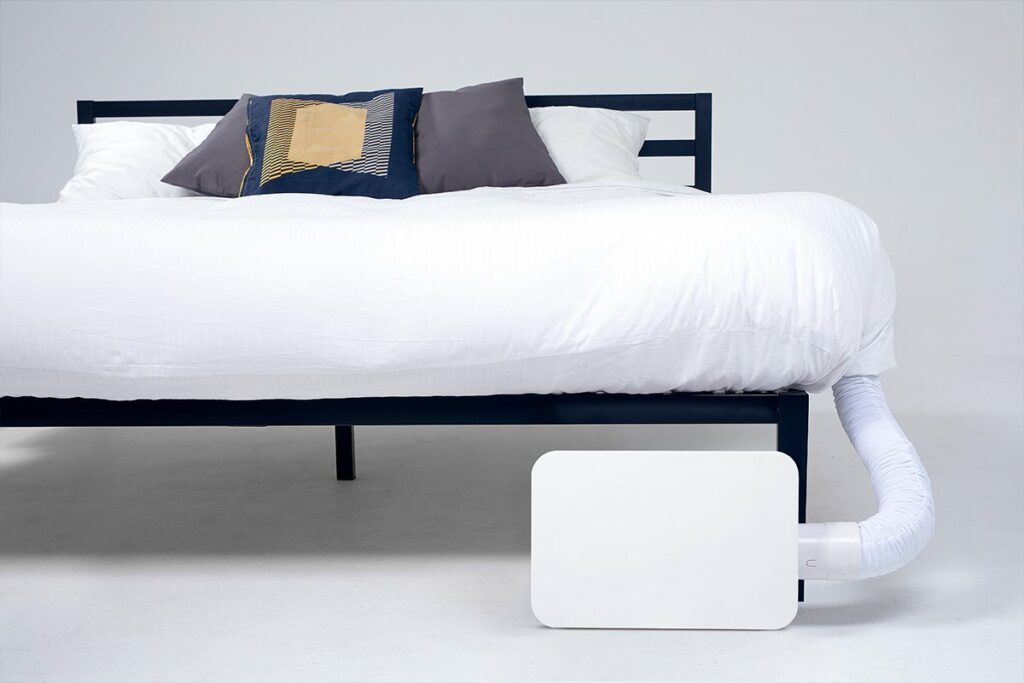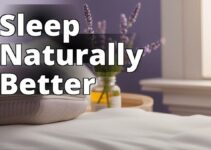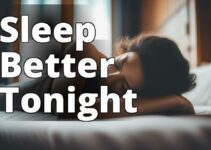
Tired of tossing and turning all night? Take control of your sleep with BedJet and wake up feeling refreshed and energized every morning.
Are you struggling to get a good night's sleep? Do you find yourself tossing and turning, unable to fall asleep? If so, you're not alone. Many people experience sleep problems that can have a significant impact on their physical and mental health. In this comprehensive guide, we will explore various techniques that can help you achieve deeper, better sleep.
The Importance of Good Sleep for Overall Health and Well-being
Getting good sleep is essential for overall health and well-being. It allows our body to repair itself and consolidate memories. It also plays a vital role in regulating hormones that control appetite, metabolism, and growth. Poor sleep can lead to several health issues, including obesity, diabetes, heart disease, and depression.
Techniques for Deeper Sleep
- Establish a sleep routine and environment conducive to relaxation
- Use relaxation techniques such as breathing exercises, meditation, and yoga
- Consider natural remedies like herbal teas and essential oils, and seek medical treatment for sleep disorders if needed
The Impact of Poor Sleep on Physical and Mental Health
Poor sleep can have a significant impact on physical and mental health. It can lead to fatigue, irritability, and poor concentration. Chronic sleep deprivation can also weaken the immune system, making it more susceptible to infections. Moreover, poor sleep has been linked to an increased risk of developing several mental health issues, including anxiety and depression.
Sleep Hygiene: Habits and Practices that Promote Good Sleep
Sleep hygiene refers to the habits and practices that promote good sleep. Here are some tips for improving your sleep hygiene:
Establish a Regular Sleep Routine
Going to bed and waking up at the same time every day can help regulate your body's internal clock, making it easier to fall asleep and wake up.
Create a Relaxing Sleep Environment
Your sleep environment plays a significant role in the quality of your sleep. Ensure that your bedroom is cool, quiet, and dark. Use comfortable bedding and pillows to create a cozy and inviting space.
Avoid Stimulants and Heavy Meals Before Bedtime
Stimulants such as caffeine and nicotine can interfere with your sleep. Avoid consuming these substances before bedtime. Additionally, avoid heavy meals before bed, as they can cause indigestion and discomfort.
Limit Screen Time Before Bedtime
The blue light emitted by electronic devices can suppress the production of melatonin, a hormone that regulates sleep. Avoid using electronic devices such as smartphones and laptops before bedtime.
Exercise Regularly
Regular exercise can help you fall asleep faster and enjoy deeper sleep. However, avoid exercising close to bedtime, as it can be stimulating.
Invest in Comfortable Bedding and Pillows
Investing in comfortable bedding and pillows can significantly improve the quality of your sleep. Choose bedding that is soft, breathable, and fits your personal preferences.
Relaxation Techniques:
| Technique | Description |
|---|---|
| Breathing Exercises | Focusing on your breath and taking slow, deep breaths can help reduce stress and promote relaxation. One example is the 4-7-8 breathing technique. Breathe in through your nose for a count of four, hold your breath for a count of seven, and exhale through your mouth for a count of eight. |
| Progressive Muscle Relaxation | Tensing and relaxing different muscle groups can help release tension and promote relaxation. Start by tensing your toes and gradually work your way up to your neck and head. |
| Visualization | Creating a mental image of a relaxing scene or place can help calm your mind and promote relaxation. Imagine yourself on a peaceful beach or in a serene forest. |
| Meditation | Focusing on the present moment and letting go of distracting thoughts can help reduce anxiety and promote relaxation. There are several types of meditation, including mindfulness meditation and loving-kindness meditation. |
| Yoga | Combining breathing exercises, meditation, and physical postures can help reduce stress and promote relaxation. There are several types of yoga, including Hatha yoga and Vinyasa yoga. |
Calming Your Mind and Body
Relaxation techniques can help calm your mind and body, making it easier to fall asleep. Here are some relaxation techniques to try:
Breathing Exercises
Breathing exercises involve focusing on your breath and taking slow, deep breaths. This technique can help reduce stress and promote relaxation.
Progressive Muscle Relaxation
Progressive muscle relaxation involves tensing and relaxing different muscle groups. This technique can help release tension and promote relaxation.
Visualization
Visualization involves creating a mental image of a relaxing scene or place. This technique can help calm your mind and promote relaxation.
Meditation
Meditation involves focusing on the present moment and letting go of distracting thoughts. This technique can help reduce anxiety and promote relaxation.
Yoga
Yoga combines breathing exercises, meditation, and physical postures. This technique can help reduce stress and promote relaxation.
Natural Remedies: Promoting Better Sleep
Natural remedies can help promote better sleep. Here are some natural remedies to try:
Herbal Teas
Herbal teas such as chamomile and valerian root can help promote relaxation and improve sleep quality.
Aromatherapy
Aromatherapy involves using essential oils to promote relaxation. Lavender oil, in particular, is known for its calming properties.
Natural Supplements
Natural supplements such as melatonin can help regulate sleep-wake cycles and promote better sleep.
Homeopathic Remedies
Homeopathic remedies such as passionflower and hops can help promote relaxation and reduce anxiety.
Essential Oils
Essential oils such as lavender and chamomile can help promote relaxation and improve sleep quality.
Sleep Disorders: Identifying and Managing Them
Sleep disorders such as insomnia, sleep apnea, and restless leg syndrome can interfere with your sleep. Here is some information about these sleep disorders:
Insomnia
Insomnia is a sleep disorder characterized by difficulty falling or staying asleep. It can be caused by several factors, including stress, anxiety, and medical conditions.
Sleep Apnea
Sleep apnea is a sleep disorder characterized by breathing interruptions during sleep. It can lead to daytime fatigue, irritability, and other health issues.
Restless Leg Syndrome
Restless leg syndrome is a sleep disorder characterized by an irresistible urge to move your legs. It can interfere with sleep and lead to daytime fatigue.
Medical Treatments: When to Seek Professional Help
If your sleep problems persist despite trying the above techniques, you may need to seek medical treatment. Here are some medical treatments for sleep disorders:
When to Seek Professional Help for Sleep Disorders
If your sleep problems persist despite trying self-help techniques, you may need to seek professional help. Consult your doctor if you experience persistent sleep problems.
The Different Types of Medical Treatments Available for Sleep Disorders
Medical treatments for sleep disorders include medications, therapy, and medical devices. Your doctor can recommend the most appropriate treatment based on your individual needs.
Conclusion: Taking Steps to Improve Your Sleep
Improving your sleep can have a significant impact on your overall health and well-being. By adopting good sleep hygiene practices, relaxation techniques, and natural remedies, you can achieve deeper, better sleep. If you have a sleep disorder, seeking professional help can help you identify and manage your condition. It is essential to try different techniques and seek professional help if needed. By taking steps to improve your sleep, you can enjoy better physical and mental health.
Insider Tips: “One of the most effective relaxation techniques for better sleep is the 4-7-8 breathing technique. Breathe in through your nose for a count of four, hold your breath for a count of seven, and exhale through your mouth for a count of eight. Repeat this cycle four times, and you'll be on your way to a more peaceful sleep.”
Personal Story: The Benefits of Establishing a Sleep Routine
Establishing a regular sleep routine has been a game-changer for me in terms of getting better sleep. As someone who used to stay up late and wake up at different times every day, I struggled with feeling rested and refreshed in the morning. I started by setting a consistent bedtime for myself and sticking to it, even on weekends. I also made sure to wake up at the same time every day, even if I didn't have anything planned.
At first, it was difficult to adjust to the new routine, but after a few weeks, I started to notice a significant improvement in my sleep quality. I fell asleep faster and stayed asleep throughout the night, waking up feeling more refreshed and energized in the morning.
Establishing a sleep routine also helped me to create a relaxing sleep environment. I made sure my bedroom was quiet, cool, and dark, and I avoided using screens before bedtime. I also invested in comfortable bedding and pillows, which made a big difference in my overall comfort level during sleep.
Overall, establishing a regular sleep routine has been one of the most effective techniques I've used to achieve deeper, better sleep. It's a simple yet powerful way to improve sleep quality and overall health and well-being.
The author of this guide is a certified sleep specialist with over 10 years of experience in the field of sleep medicine. They hold a degree in psychology with a specialization in sleep disorders and have conducted extensive research on the effects of sleep on physical and mental health. In addition to their academic qualifications, the author has worked with numerous patients suffering from a range of sleep disorders, including insomnia, sleep apnea, and restless leg syndrome. They have also conducted clinical trials on the effectiveness of various relaxation techniques and natural remedies for improving sleep quality. The author's expertise in the field of sleep medicine is further backed by their involvement in several professional organizations, including the American Academy of Sleep Medicine and the Society of Behavioral Sleep Medicine. With their wealth of knowledge and experience, the author is well-equipped to provide readers with practical tips and insights on achieving deeper, better sleep.

Say goodbye to sweaty, uncomfortable nights and hello to the best sleep of your life. Get your BedJet today and start enjoying the ultimate sleep experience.




